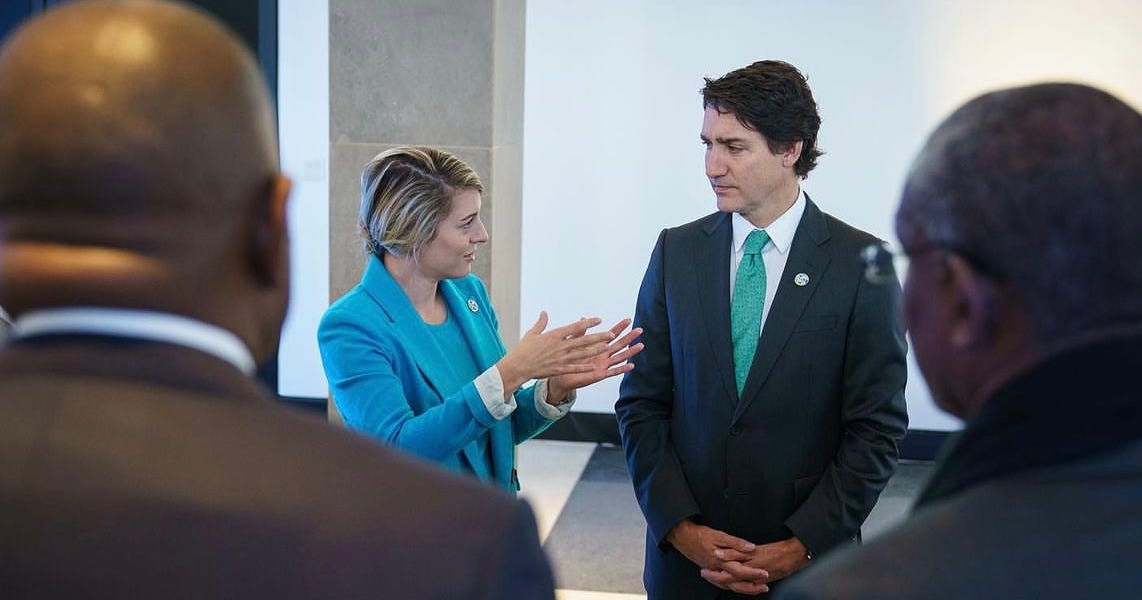Onto the other group of federal politicians who are getting on our nerves. If you spend too much time online the way your Line editors do, you might have noticed the ongoing campaign by the long-suffering Conservative MP, Michael Chong, who has been trying to figure out some defensible way to explain away his party's decision to vote against a series of measures that would give tangible form to Canada‘s stated support of Ukraine. This after the Conservatives voted en masse against a volley of government initiatives; we gave our eyes a mighty roll at the theatrics of those votes in our dispatch last week. We won’t go over all of the details again, but Chong's continued efforts struck us as interesting and worth comment.
Let us state the obvious: parties do not spend a lot of time sending out some of their best communicators to repeatedly try and explain and/or justify decisions they feel confident are working out well for them. Ukraine’s Canadian diaspora is large and politically well-organized, and the Conservatives are clearly feeling the heat. Perhaps if Mr. Chong simply sends a few more tweets, this will all be forgotten (we say with our tongues boring holes through our cheeks).
So that’s what happened/is happening. More interesting to ponder is why it happened. What the hell were the Conservatives thinking? Was no one in the room when the parliamentary plan was being hashed out able to mash together the brain cells required to grasp that voting against the Canadian military's ongoing mission to train the Ukrainian forces might not play great with Canadian-Ukrainians in the midst of Russia’s ongoing invasion of their homeland? Really?
Actually, come to think of it, sure. We can actually buy, with absolutely no problem or doubt, that the Conservatives did indeed have an acute shortage of adults in the room when this decision was made. But we suspect the answer is a little bit more nuanced and complicated than that, though maybe not by all that much.
First of all, let’s say what we don’t think it was: we are well aware that a degree of pro-Putin brain rot is a feature of right-wing politics across the democratic West. Canada is not immune to this, and we have no doubt that some percentage of the Conservative base and perhaps even the Conservative caucus is so afflicted. But we don’t see any evidence of it having hit sufficient critical mass for it to start changing how Conservatives vote in the House. It may yet. Worse is always possible, to paraphrase the prime minister, and we are certainly not guaranteed a less-stupid future, or even an equally stupid future, which is about as much as we can hope for these days.
That said, we suspect that some senior CPCers are aware of the pro-Putin thinking infecting the right, and that this may lead them to tread cautiously around some issues. But the fact is that Poilievre doesn’t really say much about Ukraine at all. This strikes us as more calculation than ideology, similar to how he avoids saying "China" and instead says "Beijing." We don't think he's pro-Putin. We just think he's a lot more worried than he ought to be about Max Bernier and the PPC.
And frankly, we would say this about Mr. Poilievre. The man is not really a radical — at least not yet. He is different from his predecessors in tone far more than in content. To our eyes, the CPC leader is a conservative campus nerd who got into politics way too early in life and then allowed his personality and worldview to harden in his early 20s.
So if it isn’t a sympathy for Putin, what does explain the votes? Frankly, we think the Conservatives are proceeding down precisely the same path that the Liberals have already advanced so far down: literally everything is politics to them. Why did they vote against all of the motions? Because they decided that they wanted oppose literally everything the government did, while making as big a show of it as possible — recall the stunts we discussed last week. Any opportunity for cooler heads to prevailing probably stalled the moment the Conservatives realized that some of the motions they would be voting against involved the carbon tax. Red to a bull, as it were.
Was this stupid? We think so. Hell, look at poor Mr. Chong. It seems obvious to us that his bosses now think it was stupid, too. But we don’t see anything alarming here, in the sense of far-right authoritarian infiltration. We just see a bunch of hard-core politicos that don’t spend nearly enough time outside their own goddamn bubbles. This is how you end up wrongly concluding that Canadians, including the millions of Ukrainian descent, will be so enamored with your voting against every single government initiative that they will fail to notice that a bunch of them were intended to provide wartime support to a country being invaded by Russia.
But like we said. A few more Chong tweets should just about fix it, right?









